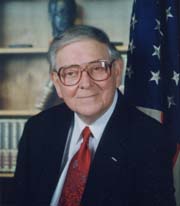
ALFRED J. LIPIN
Democrat, District 32.
Born in Pasadena, March 16, 1920. Attended Anne Arundel County public schools; University of Baltimore. Married; four children.
General Assembly:
Member, House of Delegates, 1967-71. Member of Senate, 1971-78.
Private Career and Other Public Service:
Served as Sergeant in the U.S. Army during World War II; promoted to
Second Lieutenant; awarded the Silver Star. Businessman and
real estate agent. Member, Anne Arundel County Zoning Appeals
Board, 1956-57. Past President, Glen Burnie Chamber of Commerce; North
Arundel Hospital Association. Member, Glen Burnie Civitan Club; American
Legion; Veterans of Foreign Wars; Elks; Anne Arundel Trade Council; Past
President, Glen Burnie Improvement Association; Chair, Glen Burnie Centennial
Committee, 1988; Member, Anne Arundel County Affordability Committee, 1997-98;
Member, Holy Trinity Catholic Church.
Personal Comments and Observations:
"...It was during his time in the Senate that perhaps
the most unique and, in retrospect, humorous event occurred.
A Native American in his district introduced Senator Lipin to a tribe of
Native Americans from Baltimore. This gentlemen's group met with
Al in his Glen Burnie office. They were interested in visiting the
State Legislature and wanted to know the procedures of how to observe a
general legislative session. Al invited them to come to Annapolis
as his guest at the State House to observe a Monday night session of the
General Assembly.
"The group arrived that Monday evening and seated
themselves in the balcony of the Senate chamber. As was the practice,
Senator Lipin sent a note to the President of the Senate, Billy James.
The President would then introduce them as the senator's guests at the
appropriate time in the evening.
"Senator James later introduced all the guests that
evening, including the group of Native Americans. He then discarded
the note. After they were introduced, the group provided the Senate
chamber with a short demonstration using the ceremonial drums they had
brought. Several of Al's colleagues in the Senate made favorable
comments expressing their appreciation and enjoyment of this.
"The following morning an article appeared in the
newspaper about the guests and their performance in the Senate balcony.
There was increased sensitivity in the nation in regards to the activities
of groups of Native Americans, since the events in Annapolis had occurred
a week or so after the uprising of the Indians at Wounded Knee in South
Dakota, the article caught the eye of someone at the FBI. A member
of the FBI visited Senator James in Annapolis on Tuesday morning.
Senator James was asked to provide information about the group that had
visited the session and also to produce the note that he had read.
President James was unable to provide them with the information, informing
the FBI that he had only read a note received from Senator Lipin.
The following day the State Police came to question Senator Lipin regarding
the whereabouts of this note and any other information he might have about
the group and their activities. He told the troopers the note was
probably thrown in the trash, where all of those notes go. There
was so much importance placed on finding this otherwise insignificant paper,
that the note was located on Thursday in the trash. In looking back
on the events of that week, one can only imagine the manpower used for
such an inconsequential event.
"The most controversial issues of Senator
Lipin's political career involved the location of a new prison and a proposed
oil refinery in Northern Anne Arundel County. Crown Petroleum wanted
to build a refinery in the Curtis Bay area. Senator Lipin began a
filibuster on a Friday night in opposition to this proposal. He received
help from the other senators of Anne Arundel County. Senator Mike
Miller, currently the president of the Senate, blamed Al when his wife
complained about him coming home too late.
"Senator Lipin supported the construction of a prison
to be located at the old Continental Can Building in Baltimore City.
This bill was never passed as many felt as if no additional prison facilities
were needed. Since that time several other prisons have been built
in the state.
"In reflection of this time, Senator Lipin views
his most significant contribution of his career as being the Glen
Burnie Urban Renewal project. This included the first allocation
of money for a district court building in Glen Burnie. This would
become the George Taylor District Court Building. While this project
began while he was a member of the Senate, improvements and changes continue
in that area of Glen Burnie..."
Compiled March 16, 2000 from the biographical files of the Maryland Manual, ©Maryland State Archives and from materials and photograph submitted by Senator Lipin dated November 26, 1999.